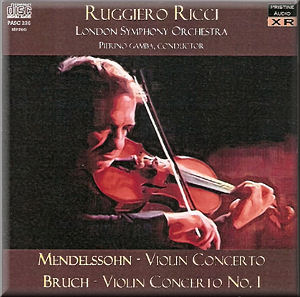 |
 |
|

availability
CD, MP3, FLAC: Pristine Audio
|
Felix MENDELSSOHN
(1809–1847)
Violin Concerto in e minor Op. 64 [27:05]
Max BRUCH (1838–1920)
Violin Concerto No. 1 in g minor Op. 26 [23:35]
 Ruggiero Ricci (violin)
Ruggiero Ricci (violin)
London Symphony Orchestra/Pierino Gamba
rec. Kingsway Hall, London 15-16 January 1957. ADD.
First issued: mono, Decca LXT5334, July 1957; stereo, Decca SXL2006,
September 1958
Transferred from LP SPA88
 PRISTINE AUDIO PASC226 [50:40]
PRISTINE AUDIO PASC226 [50:40] 
|
|
|
In various incarnations, including the 99p LP in the Decca World
of ... series from which this Pristine XR transfer has been
made, I lived with these Ricci performances until the advent
of CD. I’m pleased to make their acquaintance again, since
they can still claim to be among the best available. Given that
the XR process has brushed up the sound noticeably, though not
as spectacularly as on some of the 78 recordings which the label
has produced, you may safely order the reissue without further
ado. The greater part of the enthusiastic 1958 Gramophone
review, quoted on the Pristine website and on the rear insert
of the CD, is as valid now as it was then.
Nor can I balk at the description which Andrew Rose gives on
the website of the process involved and the result:
“These recordings are certainly very good indeed for their
era ... I was able to bring to the recordings some considerable
improvements - XR re-mastering produced results akin to lifting
a sonic veil from the originals, considerably sweetening Ricci's
upper treble tone and bringing the whole recording several steps
closer to the listener. When heard side by side with the original
the effect is immediate and utterly convincing - the 1958 recording
sounds dull and dusty; the 2010 XR re-mastering sounds almost
as if it had been recorded last week.”
I no longer have my copy of SPA88 for comparison, but memory
suggests that he is right. In a blind test, you might have difficulty
distinguishing this from much later recordings – I tried
Tasmin Little’s Bruch on Classics for Pleasure, a good
DDD recording, coupled with an equally fine Dvorák, but
sadly no longer available, immediately afterwards. If nothing
else, the re-mastering has removed the troublesome minor –
and sometimes major – surface noise which afflicted my
LPs however carefully I dust-bugged and parastated them.
To complicate matters, the identical performances, transferred
from the Decca master tapes, are also available on the Belart
super-budget label for around £5 (461 3692).
Australian Eloquence have also recently reissued Ricci’s
performances of these two works, together with concertos by
Beethoven and Dvorák, two CDs at super-budget price (480
2802, currently selling at AU$ 13.59 or £7.83 direct from
Buywell). The Mendelssohn is offered in a later performance
with Jean Fournet, but the Bruch comes in the same Gamba version
as on Pristine. I haven’t heard these reissues, so I can’t
comment on the quality of the re-mastering of either the Belart
or Eloquence vis à vis the Pristine version, but
Jonathan Woolf’s review – here
– suggests that, at the tempting price, the Eloquence
is well worth having.
Whatever the qualities of the Belart and Eloquence reissues,
I greatly enjoyed hearing these performances again, though it
no longer seems appropriate to describe Ricci as ‘caught
out nowhere’, as he was in 1958, so much have technical
standards improved since then. Not all the younger virtuosi,
however, are capable of combining Ricci’s showmanship
with delicacy of touch, both on display here at appropriate
moments. He conveys the emotion of the slow movements of the
Mendelssohn and Bruch, for example, without ever wallowing in
that emotion: the Bruch is especially heartfelt without being
weepy. By contrast, the Mendelssohn finale flies along apparently
without a care in the world.
I’ve mentioned Tasmin Little’s recording of the
Bruch with the RLPO and Vernon Handley (formerly available on
7629202) in connection with the recording quality of the Pristine
CD. That recording was made over twenty years ago, comparatively
early in Little’s career and, though she is accompanied
by the more experienced Vernon Handley, they do make rather
heavier weather of the first movement of the Bruch than Ricci
and Gamba. The basic marking is allegro moderato, but
I think they make a little too much of the moderato by
comparison with the Decca/Pristine team. In the finale it’s
again Ricci and Gamba who seem to me the more energetic: this
time they take fuller account of the modifier, energico,
in the marking allegro energico.
The Mendelssohn-Bruch coupling seems so inevitable that I sometimes
have difficulty telling which is which. The downside is that
it leaves the new CD rather short, which is one of only two
criticisms which I have. Other Ricci recordings could have been
used to boost the playing time, perhaps some of the shorter
pieces which Eloquence have included on another 2-CD set, 480
2083. I’d have welcomed in particular his recording of
Bruch’s Scottish Fantasy, a work which many –
myself included – rate almost as highly as the Violin
Concerto. That’s perhaps a little too long, though
Decca manage to combine the three works in Kyung Wha Chung’s
highly-rated performances with Kempe and Dutoit (Decca Legends
460 9762). Perhaps Pristine, HDTT or Beulah will oblige us with
Ricci’s Fantasy in the not too distant future?
Having just criticised a super-budget-price recording on the
Warner Apex label for the lack of notes, it would hardly be
consistent if I were not to make the same criticism of the present
Pristine reissue, which sells for rather more. The ‘additional
notes’ on the website – actually hyperlinks to Wikipedia
articles – are no substitute.
These minor criticisms aside, I give a strong welcome to this
reissue. Whatever versions you may have of these warhorses,
there should be room for something as good as this in your collection.
Brian Wilson
|
|




 All Nimbus reviews
All Nimbus reviews








